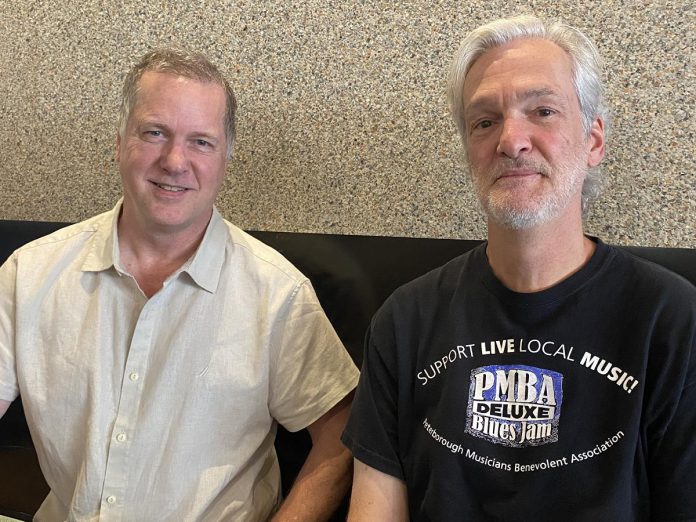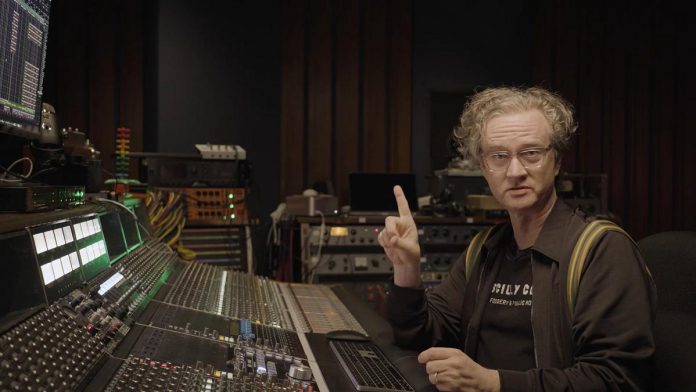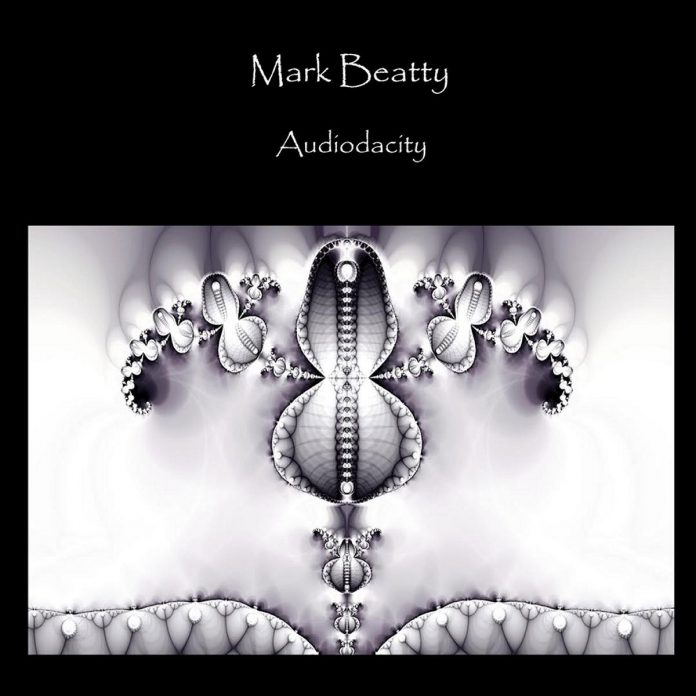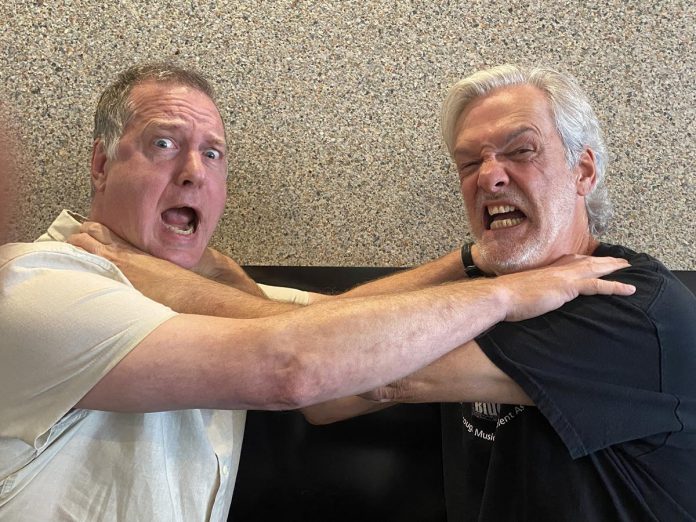
When longtime Peterborough singer-songwriter Mark Beatty wrote “If You Know About Love,” his self-assessment of the song was muted.
“It was okay,” he told kawarthaNOW in August 2022 — but local musician and producer John Crown and Grammy award-winning producer Greg Wells begged to differ.
The duo named Beatty’s original song the winning entry of round five of their Don Skuce Memorial Music Collective (DSMMC) songwriting contest, which saw the track recorded by Peterborough producer James McKenty before it was shipped to Wells for final mixing and mastering at his Los Angeles studio.
At the time, Wells said Beatty’s song “just felt great from the very first bar,” adding “I could tell he really knows what he’s doing. It’s beautiful; really quite moving.”
That’s a pretty good endorsement from the Peterborough native who has produced albums for a number of popular music heavyweights — Adele, Céline Dion, Rufus Wainwright, and John Legend among them — as well as contributed to the multi-awarded soundtracks for The Greatest Showman and Wicked films.
Fast forward to late summer 2023 when Beatty contacted Crown and expressed a desire to record a full-length album of his music — his first such project after decades performing live as a solo artist and with his band House Brand.
Two years in the making, Audiodacity is the result, with “If You Know About Love” among its 12 tracks. Available for digital purchase at markbeatty.bandcamp.com/album/audiodacity, the album was produced and mixed by Crown and McKenty at their respective studios, with two of the tracks mixed by Wells.
“I call it my second debut album,” said Beatty, joined by Crown for a recent coffee shop sit-down. “I did do another album but it never got finished. I kind of ran out of money and life just got in the way, much the way it did with this album. Circumstances were different back then and I couldn’t get back to it.”
Reflecting on the impact of his winning DSMMC entry, Beatty said that proved to be everything in terms of what followed, particularly in regard to putting his songwriting and performance talent on the radar of both Crown and Wells.

“I had this one song and it was all professionally done, but it wasn’t 100 per cent what I wanted out of the song,” recounted Beatty of “If You Know About Love.”
“I was talking to Bruce Francis, one of my bandmates at the time. He brought up John’s name and said ‘You should have had John help you with the arranging of the song.'”
“John and I were acquaintances. We didn’t know each other that well. Bruce played me a couple of things that John had done and I was like ‘Wow, that’s pretty good stuff.’ So, I reached out to John and said ‘Hey, I’ve got this song now and I want to do an album’ and then I told James (McKenty) as well.”
Providing Beatty further encouragement was Wells’ earlier assurance that if he did move forward on making a full album, Wells would mix the material free of charge.
Having written some 3,000 songs and counting, Beatty had no shortage of material to draw from, despite his self-assessment that “most of them are crap.”
Beatty says choosing what songs to focus on and which to discard outright was a process aided by soliciting the opinion of friends with whom he shared songs he was considering for the album.
“They gave me feedback and helped me whittle down the initial list,” he said.
The journey from concept to finished product is a story on its own.
The plan early on, related Crown, was to produce a “stripped-down record, with mostly acoustic instruments. The mandate was economy and minimalism.”
“I began receiving MP3s of Mark’s songs in demo form,” Crown recalled. “They were mostly rough sketches that loosely pointed toward what the finished pieces might be.”
Crown imported those MP3s into his recording software and worked on possible arrangements. Greatly helping that process along, he says, was “cutting-edge software” that allowed for the extraction of the vocal from the instrumentation.
“I could take the lead vocal from Mark’s demos and build an entirely new instrumental arrangement for it to live in, building up the music the way I thought might best suit each particular song.”
That, says Crown, was when “our original concept of acoustic instruments and minimalism swerved off the road.”
“Actually, it drove off a cliff,” he said.
Starting to hear Beatty’s songs “through a more modern lens” rather than “trying to fit such an eclectic variety of tunes into a singular approach, I built my own demo templates according to where it felt each song was leading.”
In September 2023, recording began at McKenty’s In Record Time Studio. That process continued through the winter into spring 2024.
Four tracks were sent to Wells for mixing. The album was taking shape, but then “life just got in the way” when Beatty was forced to deal with health issues. By the summer of 2024, he says he had lost “a shocking” amount of weight.
During the overdubbing process, which sees a vocal or instrument recorded over a section of an existing track, it was discovered that Beatty’s voice had changed.
According to Crown, “He sounded like two different singers. It was impossible to match the two performances (the original vocal track and the new vocal track). The project had to be shut down.”
“That was crazy to me — I thought I was fine,” recalls Beatty, with Crown noting Beatty’s voice change made it impossible to do lyrical revisions to existing vocal tracks.
“We were trying to match a vocal that was done months earlier and it became glaring that the timbre of his voice was completely different,” adds Crown.
As 2024 wound down, seeing some improvement in his health, Beatty was able to get one song recorded before his voice started to wane. Things were looking good. Then, another setback — this one affecting Wells and his family.
In early January 2025, the Pacific Palisades community of Los Angeles was ravaged by wildfires. Wells and his family were safe, but they lost their home and his mixing studio. With Wells faced with having to pivot to work on music for Wicked 2, the mixing of Beatty’s album fell to Crown and McKenty.
Come March 2025, Beatty was back in form with his health having rebounded and the race was on to have all of the album’s tracked mixed by the end of June. That deadline was met, the tracks were mastered at Grey Market Mastering in Montreal and the album, so very long in the making, was done.

“I am absolutely over the moon that we’ve seen it to the finish line,” said Beatty. “There was a point there where I didn’t know if I was going to come back. I was becoming aware of John’s time and James’ time and the burden I was putting on them. I’m really excited that I got better and we were able to see it across the line.”
“Two years, 12 songs … it’s a double-edged sword kind of thing. I’m really excited that it’s out and people can listen to it, buy it, do whatever they want with it, but on the other hand, I’m so sick of these 12 songs. This is common. You often hear artists say they just want to move on and do something different.”
With Audiodacity featuring musical contributions from Greg Wells as well as a number of local musicians — Crown, James McKenty, Melissa Payne, Jimmy Bowskill, Carling Stephen, and Victoria Yeh among them — Beatty feels “blessed” for the support that members of the local music community habitually show each other.
For his part, Crown said the diversity of Beatty’s music “is what made it interesting for me right off the bat.”
“You want to be working with someone who’s pushing your creative buttons. The music that came across my desk, there was something in there. It might have been a melody. It might have been a lyric. There was something in there that was interesting.”
“That’s all you can ask for when you’re producing a record. Otherwise, you’re just chasing your tail. If something is boring, it’s just going to be boring. You can’t un-bore boring.”
As both Beatty and Crown await the arrival of 200 hard copies of the album — details of their arrival, and where and how they can be purchased will be announced on Beatty’s Facebook page — it’s not lost on them that what’s most important came through the process intact.
Despite creative disagreements over the past two years, they remain friends, able to come together in a downtown coffee shop and laud what each brought to the table to the great benefit of what Beatty describes as “our album.”
The album’s title, says Beatty, is a word he made up that refers to “a bold and daring act of sound.” Now, releasing his first album at the age of 65 after decades as a musician, Beatty fully admits to having being bitten by the recording bug.
“I think there will be a second album, but we’ll have to wait and see.”



























